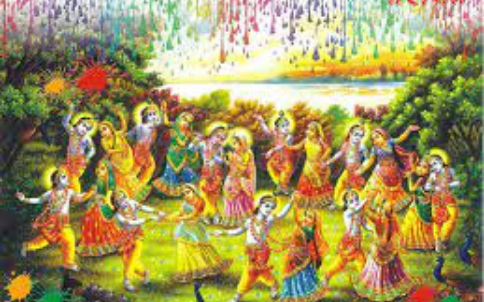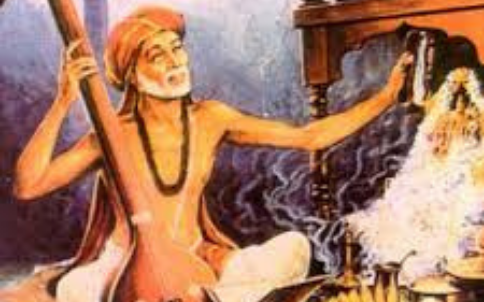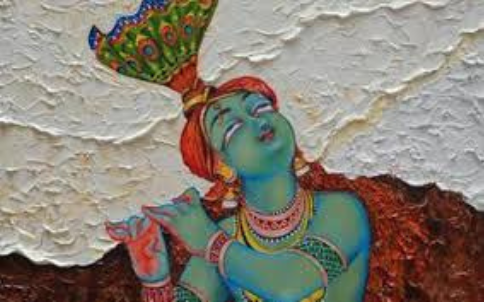SreeRagam 21
Sadinchene O Manasa is one of the five gems of Pancharatnakritis composed by Tyagaraja.. An immortal composition, in Arabhi raga. The Pancharatnakritis are the elaborate kritis composed in Ghana ragas like Nata, Goula, Arabhi, Varali and Sri.
Sadinchane O Manasa is an invaluable composition of Tyagaraja addressed to Lord Sri Krishna.
Also read: Nagumomuganaleni…
Tyagaraja accuses Lord Krishna as an opportunist, cunning and deceitful, who behaved contrary to his own teachings. It is an exceptionally alluring composition which can be summarised in a few lines as…

“O mind you have achieved! O Lord, You could deceive your parents Devaki and Vasudeva and also the gopikas who surrenedered to you. I place you in my heart eternally and despite my ardent devotion for you, you have not showered your divine grace upon me.“
Also read: Kaddanuvariki……
It is composed in an imposing tone, full of metaphor and similes. It is also a rare composition in which Tyagaraja refers to both Lord Rama and Lord Krishna, elevating Rama as the MaryadaPurushottam and taking liberty to label Lord Krishna as a Cunning Lord….
Also read: Tulasidalamulache……
History
Arabhi is an ancient and auspicious raga. It dates back to 7th century. It is an important raga that was mentioned in old musical treatises like ChaturdandiPrakasika, SangrahaChoodamani. But it has upheld its authenticity and evolved as one of the most appealing ragas in Carnatic Classical music. Originally, it was called as pazhanthakkam in Ancient Tamil music.
Also read: Samaja Varagamana
Mood
Arabhi is an energetic raga that infuses a spirit of bhakti and veerarasas. The pleasing swaras cast a spell on the senses and linger in memory compelling the rasikas to seek for more….
Also read: Vatapi Ganapatim Bhaje…..
Considered as an auspicious raga, it features regularly in temples in religious rituals and festivities. It is best suitable for any time of the day and is usually employed for faster pace compositions and as a commencement in a concert.

Structure
Arabhi raga is a janyam of the 29thMelakarta raga DheeraSankarabharanam.
Arohana SR2M1PD2S
AvarohanaS N3 D2 P M1 G3 R2 S
(Shadja, ChatusrutiRishabha, Antara Gandhara, SuddhaMadhyama, Panchamam, ChatusrutiDhaivata and KakaliNishada are the swaras of the raga. It is an audava-sampoorna raga that has five swaras in the ascent and all seven swaras in the descent.
The beautiful oscillations or gamakas enable the artist to explore and expand the raga and is best suited for exposition on instruments like veena. It is a versatile raga suitable for various forms of classical music compositions like geetam, varnam, kriti, raga malika and devotional songs.
Arabhi raga has closer resemblances with ragas like Devagandhari and Sama.
Compositions
It is interesting to note that the temple of Tiruvattiyur, is an abode for Lord Adipureeswara and Devi Tripurasundari. Tyagaraja and Deekshitar eulogised these dieties in their compositions in the same raga, Arabhi. Tyagaraja composed ‘SundariNinnuKarunimpa’ and Deekhshitar praised Lord Adipureeswara in the kriti, ‘Adipureeswaram’. Possibly there are no similar compositions addressed to the same deities in the similar raga by any other composers.
Also read: Pakkala Nilabadi…..
The repertoire of Carnatic classical music is resplendent with compositions in this distinctive raga. Most of the composers presented the pristine nature of the raga through their immortal compositions. Among the musical trinity, Tyagaraja composed around fourteen compositions in Arabhi raga. A few among his musical bounty are:
Naasudharasambilanu, O Rajeevaksha, Chootamu Rare, Patikimangalaharati, O Rama, Rama, Palukavemina
Deekshitar’s Saraswathi, Sivakameswarim, Adipureeswaramexude spiritual ecstasy.
PalayasumamParadevate is an exemplary composition by SyamaSastry.
NarasimhaMamava, Sri ramanavibho, PahiParvatanandini are the priceless gems of Swati Tirunal.
Film Music
Telugu
NamoNarasimha – Bhakta Prahlada
TapamuPhalinchinaSubhavela – Sri KrishnarjunaYudham
Jaya Jaya Sri rama – Jayasimha
Pachabottucherigipodule – PavitraBandham
Also read: Jagadananda Karaka…





Excellent